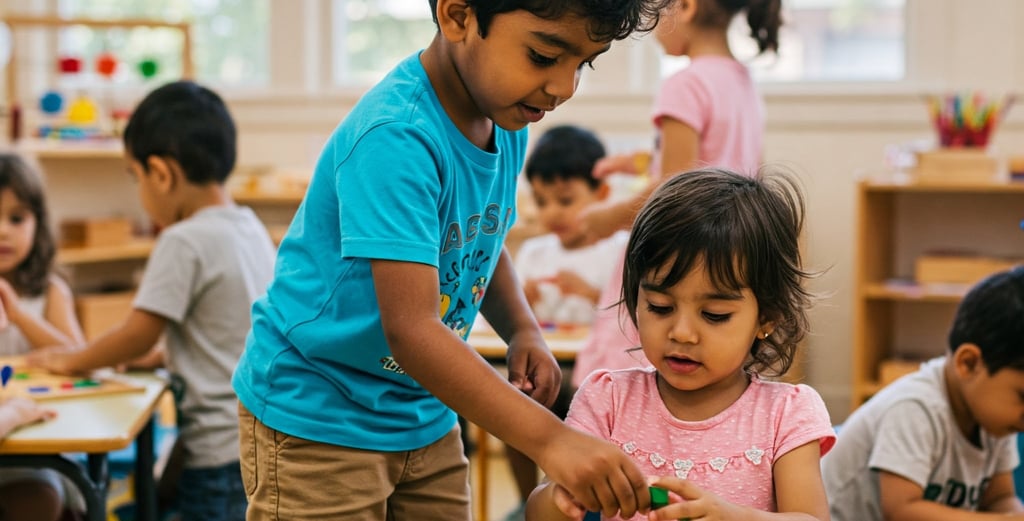Admissions open for YEAR 2026-27
The Magic of Montessori: What to Expect When Your Child turns Six
Discover the magic of the Montessori final year, where children experience a transformative journey, blossoming into independent, confident leaders ready for the next educational chapter.
PARENT RESOURCES
Little Florets' Montessori
4/11/20253 min read


The Magic of Montessori: What to Expect in Your Child’s Final Year
As your child nears the end of their time in the Montessori primary classroom (ages 3-6), you might hear parents excitedly talk about the "magic" that happens when a child turns five or six. It's a special milestone, and many parents eagerly look forward to seeing their child blossom into a confident, independent little person. But how does this magic happen, and what needs to take place for your child to reach this point?
What Happens in the Final Year?
In the Montessori method, the classroom is mixed-age, meaning children of different ages learn together. When your child is nearing five or six, they’ve reached the point where they are no longer the youngest in the class. Instead, they become role models for the younger kids, guiding and helping them with tasks they once struggled with. This is a big step! Your child is no longer just learning, but teaching, reinforcing their own skills by helping others.
The Power of Independence
One of the biggest lessons in Montessori is learning independence. Over the years, children are encouraged to do things for themselves, whether it’s pouring water, washing tables, or putting away their belongings. These activities help strengthen important muscles in their arms, hands, and wrists, preparing them for more complex tasks like writing. By the time your child reaches five, they are becoming experts at doing things on their own, like managing their belongings or completing tasks independently. This ability to make decisions and act on them is a powerful skill.
In the final year, your child will also practice controlling their impulses. They can sit for longer periods of time, concentrate on tasks, and focus on a single activity for an extended time, whether it’s building a tower or solving a puzzle. This growing concentration will help them as they transition to elementary school, where sitting still and staying focused are crucial.
Building Emotional and Social Skills
Along with developing physical and mental independence, children in the Montessori classroom also develop important emotional and social skills. As your child turns five or six, they learn how to help others and how to ask for help when they need it. They start to notice when a friend is struggling and may offer to help them. This is a sign of emotional growth! At this age, your child also becomes more sensitive to what’s right and wrong, and they will often remind others to follow the rules. While this may sometimes seem like tattling, it’s actually a sign that they’re developing a strong moral compass, guided by the Montessori principles of respect and kindness.
The Importance of Readiness
Learning in Montessori isn’t just about following lessons or practicing skills. It’s about being ready. Each child develops at their own pace, and true learning can only happen when they are mentally and emotionally prepared. For instance, your child may have been practicing reading for a while, but true reading doesn’t come just from repeating words; it happens when they are able to connect those words to their own thoughts and ideas. This is why it’s so important to ensure your child is surrounded by a rich vocabulary and lots of reading at home. Encouraging a love of reading and writing early on can set them up for success.
If your child seems resistant to reading or writing, don’t worry! Every child is different, and resistance is often just a sign that they need more support. You can try to make reading and writing fun, using art or creative activities to spark their interest.
The Final Year: A Magical Transition
The final year in the Montessori classroom is full of excitement and growth. By now, your child has developed key skills that prepare them for the next stage in their education and life. The leap they make in their final year might seem like a burst of magic, but it’s actually the result of a lot of hard work, patience, and nurturing from both the school and the home environment.
This "magic" happens when all the pieces come together: the classroom routines, the encouragement from their teachers, and the support they get at home. By the time your child leaves the Montessori classroom, they are not only academically prepared but emotionally ready to tackle new challenges and thrive in a more formal learning environment.
So, while the magic may seem like it happens overnight, it’s actually the result of years of carefully layered learning and growth. When all these foundational skills are in place, your child is ready to take on the world!



